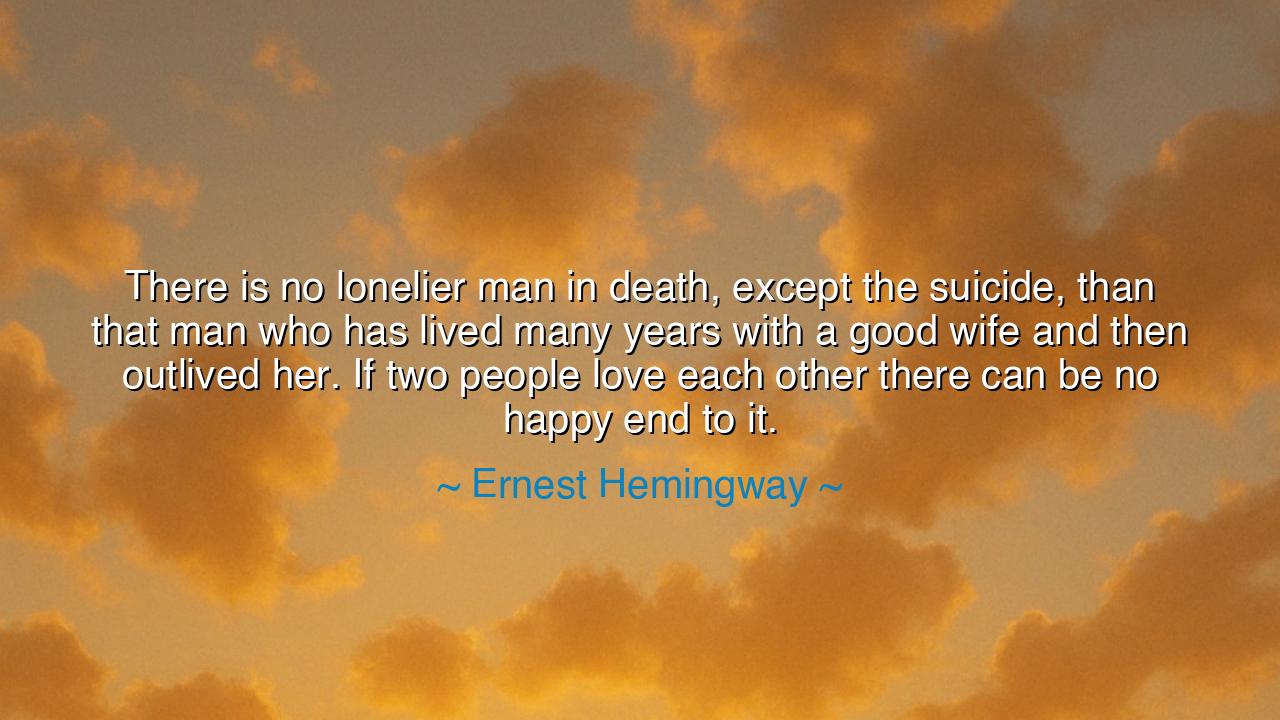
There is no lonelier man in death, except the suicide, than that
There is no lonelier man in death, except the suicide, than that man who has lived many years with a good wife and then outlived her. If two people love each other there can be no happy end to it.






“There is no lonelier man in death, except the suicide, than that man who has lived many years with a good wife and then outlived her. If two people love each other there can be no happy end to it.” Thus wrote Ernest Hemingway, the poet of courage and loss, the chronicler of human strength and sorrow. In these words, he speaks with the heavy authority of one who knew both the sweetness of love and the desolation of its absence. His is not the cynicism of the heartless, but the wisdom of one who has loved deeply and watched that love slip into the grave. Here, he reveals a truth that pierces like a blade: that the more profound the bond between two souls, the sharper the pain when that bond is severed by death.
Hemingway, a man who wrestled with life in its rawest forms — war, adventure, and love — understood that all beauty carries within it the seed of its own tragedy. His quote was not born from despair, but from honesty. To him, love was not a story of endless bliss, but of courage — the courage to live knowing that all things end. When he wrote, “there can be no happy end to it,” he did not mean that love is futile, but that it is mortal, as we are. It is a gift that blesses and wounds in equal measure. For when two people truly love, one must one day walk alone, carrying both halves of a shared life within a single heart.
To understand his words, one must see the world through his eyes. Hemingway had known passion and partnership, but also death and separation. His life was marked by loss — of friends fallen in war, of marriages broken, of health and hope eroded by time. And yet, he never turned away from love, though he knew its cost. He wrote as one who had looked into the abyss and still chosen to embrace life. The loneliness he describes is not the absence of company, but the absence of the one soul who made the world whole. It is the silence after a symphony, the shadow left when the sun has gone.
There are many who have lived the truth of his words. Think of Queen Victoria, who, after the death of Prince Albert, withdrew from the world in mourning for decades. Though she ruled an empire, she lived like a widow of the soul, finding no comfort in crown or country. Her grief was not weakness but testimony — testimony that love, once joined in fullness, leaves behind no substitute. Such mourning is the price of devotion; it is love’s final proof. To outlive the beloved is to become, in a sense, half-alive — to breathe, but no longer in rhythm.
Hemingway’s statement also carries a broader truth: that all human joy is shadowed by impermanence. “If two people love each other, there can be no happy end to it.” In those words lies the paradox of existence — that love, our greatest blessing, is bound by time. Yet it is precisely this impermanence that gives love its urgency and its meaning. For if it lasted forever, we would not cherish it so fiercely. Knowing that it must one day end, we hold our loved ones tighter, we speak our hearts more freely, and we live more fully in the fragile light of the present. The pain of loss, then, is the echo of how deeply we have lived.
And yet, even in his darkness, Hemingway’s truth is not entirely grim. For while love may end in death, it is never truly destroyed. The one who remains carries within them the memory, the laughter, the shared glances that no grave can take away. Love changes form — from presence to memory, from dialogue to silence — but it endures in spirit. In this sense, the “loneliest man in death” is also the most blessed, for he has known what it means to be truly seen, truly understood, and truly loved. The grief that follows such love is but the shadow of its light.
So, my child, take from Hemingway’s words not despair, but reverence. Do not flee from love because it ends; love all the more because it will. Know that every embrace, every kind word, every shared moment is sacred precisely because it cannot last forever. Live so that when loss comes — as it must — you may carry no regret, only gratitude. And when you find yourself alone, remember: the depth of your sorrow is the measure of the greatness of your love.
For as Hemingway teaches, love and loss are twin companions, bound together by fate. To have one without the other is to have neither. Accept this truth, and you will no longer fear the ending — for the end of love is not destruction, but transformation. And when your own final hour comes, you will not fear that, either — for you will know that you have lived, truly lived, in the fullness of the heart.






AAdministratorAdministrator
Welcome, honored guests. Please leave a comment, we will respond soon